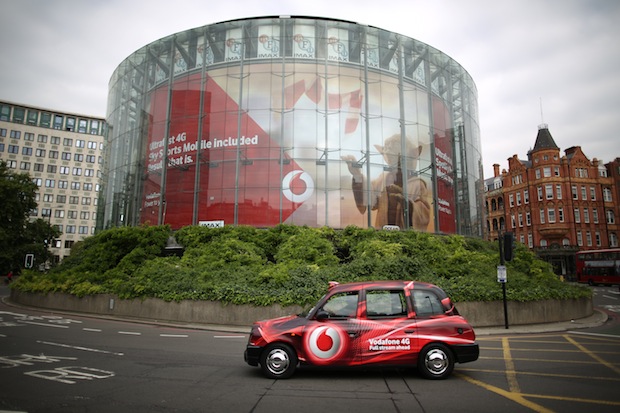Vodafone, which has just collected an £84 billion windfall from the sale of its 45 per cent stake in Verizon Wireless of the US, is either a hero or an anti-hero of British capitalism, according to taste. To me, the world’s second-largest mobile phone business is heroic because it achieved that position from a standing start just 30 years ago, when poker-playing Ernie Harrison, chief executive of a military radio manufacturer called Racal, bet everything he had on the future of mobile telephony. At a time when other electronics companies thought it too uncertain a prospect to bother trying to compete against the monopolistic British Telecom, Harrison and his colleague Gerry Whent started Vodafone (originally Racal Telecom) in a small office in Newbury, and grabbed half the UK market. It was the most important British start-up of the 1980s, the only one to compare with the new giants of the US technology scene.
To other observers, however, Vodafone exemplifies much that is bad about modern corporate behaviour. Former HMRC inspector Richard Brooks, in The Great Tax Robbery, fingers the company as an arch-exponent of the use of European tax havens to avoid billions of pounds of UK taxes, illustrating his point with a photograph of an unmarked door to ‘the locked office that is home to Vodafone’s Luxembourg companies’ Swiss finance branches’.
Vodafone has also never quite lived down the terrible precedent set by its board in awarding a £10 million ‘transaction bonus’ to then chief executive Sir Chris Gent merely for completing the £112 billion takeover of Mannesmann of Germany in 2000, without waiting to see whether it generated good value for shareholders. The deal took the group to the top of the FTSE 100 but also drove it into temporary losses, and the market’s conclusion was that Mannesmann had been grossly overpriced.
No such hindsight seems likely to apply to the cash sale of the Verizon stake, which will generate £54 billion of dividends, of which £22 billion is for UK investors. What it won’t generate are any payments at all to HMRC, because the Verizon shares were held through a ‘Dutch holding company’. Margaret Hodge MP, who makes so much personal mileage out of bashing corporate tax avoiders from her position as chair of the public accounts committee, has been squeaking, but Vodafone’s Vitorio Colao says simply ‘we apply the rules’ — and you may be sure his tax lawyers checked them before the announcement was made.
The deal still brings a bundle of money back to the UK economy at a crucial time, and what really matters is how Vodafone now invests the £20 billion-plus that it’s not paying out in dividends, transactions costs and US taxes. ‘Consolidating our position in mature European mobile and cable markets’ sounds sensible enough as a strategy; but what would really be exciting would be to rediscover Vodafone’s heroic founding spirit — and back the kind of venture, whatever it may be, that’s destined to be the next big thing.
Stop pumping
Net lending by banks participating in the Bank of England’s Funding for Lending scheme rose by £1.6 billion in the second quarter, after falls in the previous two quarters — but it’s all going on mortgages, fuelling rising house prices, rather than to businesses, whose borrowings under the scheme actually reduced. That’s not a healthy trend, even if rising house prices make lenders’ existing mortgage portfolios look safer and thereby increase their willingness to lend on all fronts. But what’s also interesting is that so many bankers say smaller businesses just don’t ask them for loans these days — an anecdotal trend confirmed by a survey from Bibby Financial Services, which found that 62 per cent of 1,000 business owners interviewed said they had not applied for bank funding in the past six months. Of those that had applied, 17 per cent had been turned down — but that doesn’t seem too harsh, given that no one would put their savings in a bank that said yes every time. Meanwhile, conditions for well-run businesses of all sizes continue to improve, with yet more positive signals from the manufacturing sector this week. So perhaps we’re seeing a business recovery that is not being built on bank credit, but on smart cash-flow management and private capital. And perhaps the Bank of England should stop pumping money into the housing market before it does more harm than good.
Shock therapy needed
This is my last French dispatch, and although I missed another top seaside meeting — it was ‘Les Amis de Nicolas Sarkozy’ at Arcachon, and I was secretly relieved not to be asked — someone in Paris must have read last week’s column about how fed up the French are with tax rises. This week there was actually a cut: a one-year reduction in capital gains tax on sales of second homes and buy-to-let properties.
I doubt it will halt the steady flow of capital towards South Kensington, however, given the huge number of bright young French people now choosing to make careers in London rather than Paris.
As ministers return to work after the summer break, they should focus not on trying to provoke a short-term property bubble as a token of recovery but on the more fundamental issue of labour-market competitiveness: one estimate puts the hourly cost of French labour at €34, compared with €30 in Germany and €20 in the UK. As a Francophile who wishes them well, I’d like to have made that point at one last summer gathering, at which François Hollande’s cabinet painted their vision of ‘La France 2025’: full employment, social harmony, bubbling innovation, global influence. In response to such wishful thinking, I can only quote Le Figaro columnist Nicolas Baverez: without ‘une therapie de choc’ to knock its unsustainable social and fiscal model into shape, France is destined for ‘the rank of peripheral nation, spectatrice du monde de 2025’.







Comments